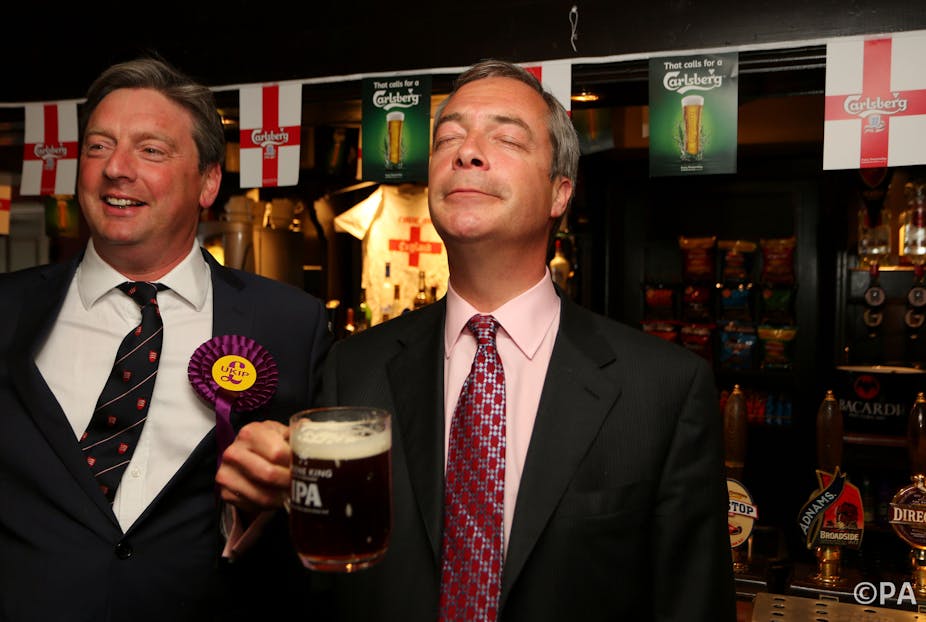You’ll be expecting, understandably, UKIP stuff – and there will be, but later. But first let’s look at results of the elections to determine the political and policy control of 161 English local authorities. Working for a department known in the wider world as the Institute of Local Government Studies, it would be inappropriate for me not to look first at those councils where we know control has changed hands, none of which directly involve UKIP – almost inevitably, given its almost baseline starting point.
A big change was Hammersmith & Fulham, where Labour took 11 seats from the Conservatives and regained the control it lost in 2006. It wasn’t Labour’s only gain in London’s all-out elections, but its “suburban mindset” strategy for London meant that inner London H & F wasn’t even on its publicised target list.
No gains for UKIP there, and, as a further reminder that London as a whole is, currently at least, the party’s weak spot, none in Kingston upon Thames. It was one of the two boroughs where the Liberal Democrats held a majority, but it had already been reduced from six in 2010 to one, so it perhaps wasn’t surprising that the Conservatives were able to make the final push and take control. But, by way of emphasising they were indeed local elections, in Sutton, the Lib Dems’ other London borough, they strengthened their hold by taking two seats from the Tories.
Staying with the Lib Dems, they also lost majority control of their single unitary authority, Portsmouth, and here UKIP certainly was an influence. At last year’s Hampshire County Council elections its candidates had won ten seats – and it repeated the trick this time, with five gains from the Lib Dems and one from Labour. The Lib Dems remain comfortably the largest single party, and it would require a politically rather odd “rainbow coalition” of Conservatives, UKIP and Labour to outnumber them. After five years of governing with a majority, though, minority control is only a very partial consolation.
The same is true in reverse, as in Walsall. For the second time running, Labour had hopes of regaining majority control and failed. It made two gains, strengthening its position as the largest party with exactly half the council’s 60 seats. But UKIP gained three and were instrumental in preventing Labour from regaining majority control for what would have been the first time this century.
In Walsall, though, we did learn almost straight away that Labour would take over from the Conservative-Lib Dem coalition and govern as a single-party minority administration. In several other councils where the Conservatives lost overall control, though, the fine balance of the party arithmetic meant that the crucial outcome – who controls the council – remained uncertain.
‘Essex man’ turns to UKIP
A huge concentration of those Conservative losses was in Essex, notably Basildon: UKIP gained 11, mainly from the Conservatives; Castle Point: UKIP took five from the Conservatives; and Southend-on-Sea, where UKIP won five seats, but Labour and Independents also made gains. By way of balance, at the London end of the county, UKIP was the main cause of Labour losing overall control of Thurrock, taking three of its seats but also two from the Conservatives.
In a kind of microcosmic way, these Essex results demonstrate the improbability of the kind of electoral pact or overt understanding between the Conservatives and UKIP that some panicked Conservative MPs were tweeting for as these results came in.

The idea seems to be based on the assumptions that almost all UKIP votes are taken from the Conservatives and that all defecting Conservatives would return “home”, if UKIP could somehow be bought off – neither of which, the polls suggest, is really the case.
Nigel Farage’s early and uncharacteristically considered reactions to his outstanding night seem closer to reality. UKIP is now a “serious player” in what, for the foreseeable electoral future, is a four-party system. It has an unmistakeable, and in several places exploitable, “imprint” in English local government.
Moreover, this is true both “right across the country” and across party – from Lib Dem Portsmouth, up through Essex, to Dudley in West Midlands and ultra-Labour Rotherham in the North.
This political and geographical spread, Farage suggests, will enable UKIP, like the Lib Dems in 1997, to target areas where they know they have proven support and elected representatives. The Lib Dems had polled 24% in the 1996 local elections and more than doubled their parliamentary representation the following year. On Thursday it looked as if UKIP was getting about 25% of the vote in the seats it contested, and it would be a bold party strategist to say that the “buffoon” has it all wrong.

